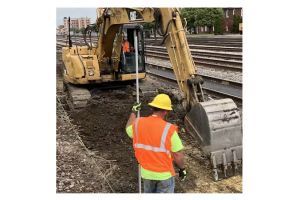Currency
April 12, 2020

All employers must revise their respiratory protection programs (RPPs) to include the circumstances under which the PPE is contaminated and not available for "extended use or reuse."
OSHA's newest interim guidance issued on April 3 concerns all American workers exposed to respiratory hazards along with healthcare personnel (HCP) on the front lines of the COVID-19 outbreak.
The memo follows a March 11 memorandum that allows healthcare employers to temporarily switch from a quantitative fit testing method to a qualitative testing method to preserve the integrity of N95 respirators.
"Due to the impact on workplace conditions caused by limited supplies of N95 filtering facepiece respirators (FFRs), all employers should reassess their engineering controls, work practices, and administrative controls to identify any changes they can make to decrease the need for N95 respirators," the memorandum states.

Hospital systems across the country have expressed the dire need for personal protective equipment (PPE) since the initial outbreak healthcare providers saw a drastic rise in the number of patients.
Some companies have converted their manufacturing plants to produce face masks, while others have set out to improve mask decontamination methods.
Retailers such as Home Depot that sell N95 respirators have cut off sales to the public to ensure frontline workers receive supplies first.
Federal, state and local agencies also have focused efforts on PPE hoarding schemes related to the COVID-19 pandemic.
In accordance with the temporary guidance, OSHA is permitting extended use or reuse of respirators as long as the PPE "maintains structural and functional integrity and the filter material is not physically damaged, soiled, or contaminated (e.g., with blood, oil, paint)."
All employers must revise their respiratory protection programs (RPPs) to include the circumstances under which the respirator is contaminated and not available for "extended use or reuse."
Because of contact transmission hazards, OSHA recommends extended use over reuse due to the risk of donning/doffing. Employers also need to be cognizant of how workers are storing FFRs between periods of reuse.
The memorandum recommends increasing the use of wet methods or portable local exhaust systems or even moving tasks outdoors. Non-essential operations could also be suspended for the duration of the pandemic.
OSHA's newest interim guidance issued on April 3 concerns all American workers exposed to respiratory hazards along with healthcare personnel (HCP) on the front lines of the COVID-19 outbreak.
The memo follows a March 11 memorandum that allows healthcare employers to temporarily switch from a quantitative fit testing method to a qualitative testing method to preserve the integrity of N95 respirators.
"Due to the impact on workplace conditions caused by limited supplies of N95 filtering facepiece respirators (FFRs), all employers should reassess their engineering controls, work practices, and administrative controls to identify any changes they can make to decrease the need for N95 respirators," the memorandum states.

Hospital systems across the country have expressed the dire need for personal protective equipment (PPE) since the initial outbreak healthcare providers saw a drastic rise in the number of patients.
Some companies have converted their manufacturing plants to produce face masks, while others have set out to improve mask decontamination methods.
Retailers such as Home Depot that sell N95 respirators have cut off sales to the public to ensure frontline workers receive supplies first.
Federal, state and local agencies also have focused efforts on PPE hoarding schemes related to the COVID-19 pandemic.
Extending and Reusing
In accordance with the temporary guidance, OSHA is permitting extended use or reuse of respirators as long as the PPE "maintains structural and functional integrity and the filter material is not physically damaged, soiled, or contaminated (e.g., with blood, oil, paint)."
All employers must revise their respiratory protection programs (RPPs) to include the circumstances under which the respirator is contaminated and not available for "extended use or reuse."
Because of contact transmission hazards, OSHA recommends extended use over reuse due to the risk of donning/doffing. Employers also need to be cognizant of how workers are storing FFRs between periods of reuse.
The memorandum recommends increasing the use of wet methods or portable local exhaust systems or even moving tasks outdoors. Non-essential operations could also be suspended for the duration of the pandemic.









